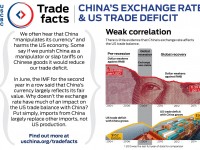Zhao Minghao, Professor, Institute of International Studies at Fudan University, and China Forum Expert
Jul 29, 2016
The US wants China to deepen its market-oriented reform and maintain social stability, and on the other, it demands that China reduce its excess capacity immediately. These two tasks are obviously contradictory, and now that China has become the largest trading partner of the US, a cooperative approach by both sides is both logical and necessary.
Eric Farnsworth, Vice President, COA, Washington D.C. Office
Jul 29, 2016
In the run-up to Rio, the next three Olympic hosts, all Asian nations, must understand the broader implications and global expectations that come with hosting this event. The Olympics may have grown too weighed down by excessive external baggage to be sustainable in their current form, something that will have to be taken into account moving forward.

Jul 27, 2016
We often hear that China “manipulates its currency” and harms the U.S. economy. Some say if we punish China as a manipulator or slap tariffs on Chinese goods it would reduce our trade deficit. But what does currency manipulation mean? More importantly, would tariffs on Chinese goods help our economy?
Stewart Taggart, Founder & Principal, Grenatec
Jul 21, 2016
After the tribunal’s categorical ruling on the South China Sea, China’s new strategy could be to lower the temperature by reframing the issue away from rocks, sand and physical territory. It could then seek to reframe the issue around the potential multilateral benefits of China’s Maritime Silk Road concept.
Xu Duo, Fox Fellow, Yale University
Jul 21, 2016
Using his recent election win to focus on restoring Japan’s military would be abusing the mandate sanctioned through the democratic process. The election was won on economic issues and fears, and that should be the prime minister’s top priority.
Yin Chengde, Research Fellow, China Foundation for International Studies
Jul 14, 2016
Hosting the G20 Hangzhou summit will boost China’s reform and will be a new starting point for China’s growth and development. The Hangzhou summit will also set a new vision for the G20 and shape a new pattern for global economic growth, thus benefiting the entire international society.
Zhang Monan, Deputy Director of Institute of American and European Studies, CCIEE
Jul 11, 2016
“Dollar liquidity shortage” is inevitable in the future, and improving liquidity management including cross-border capital flow and monetary reserves is the key to systematic risk control and crisis management. A global macro-prudential supervision frame should be established to supervise the cross-border capital liquidity as the core target and measure for capital management.

Dean Baker, Co-director, Center for Economic and Policy Research
Jul 04, 2016
An outflow of capital from China, and the trade deficit it has created for rich countries and especially the United States, has led to an enormous gap in demand. The key route to reducing the trade deficit is a lower value of the dollar, which would require China to decrease its foreign reserves. As negotiations work, this would mean the United States would have to make concessions in other areas of the bilateral relationship.
Derek Scissors, Resident Scholar, American Enterprise Institute
Jul 04, 2016
It is not a good time for American supporters of trade and investment with China. For political reasons, protectionist steps by the U.S. may be unavoidable in 2017. In the name of “making China play fair,” trade barriers risk hurting ordinary Americans and offering little in the way of gains. Derek Scissors argues that it is important to recognize that some policies are more justified and less dangerous than others.
Zhang Jun, Dean, School of Economics, Fudan University
Jul 04, 2016
The accuracy of China’s official GDP and growth rates has long been a hotly debated topic, with the detention in January of Wang Baoan, the director of the country’s National Bureau of Statistics, on graft charges intensifying doubts about the agency’s integrity.
Back to Top

- China-US Focus builds trust and understanding between the U.S. and China through open dialogue among thought leaders.
- Our Offerings
- Topics
- Videos
- Podcasts
- Columnists
- Research Reports
- Focus Digest
- Stay Connected
-
Thanks for signing up!
- Get the latest stories from China-US Focus weekly.